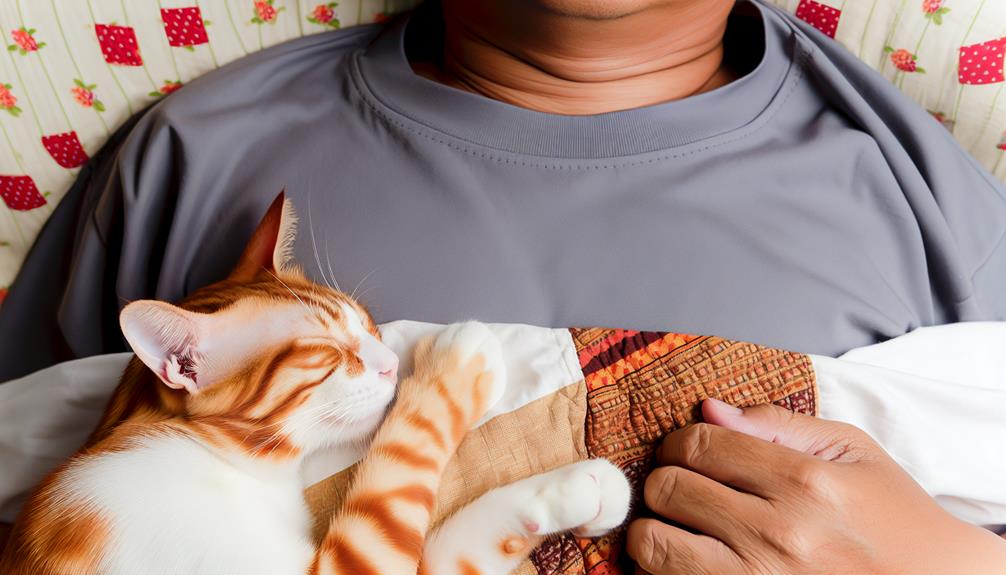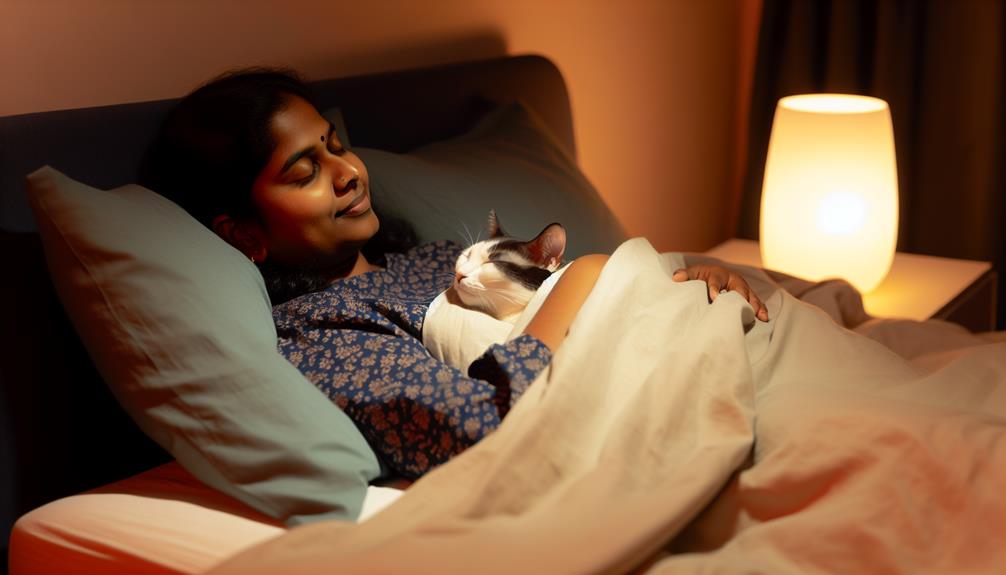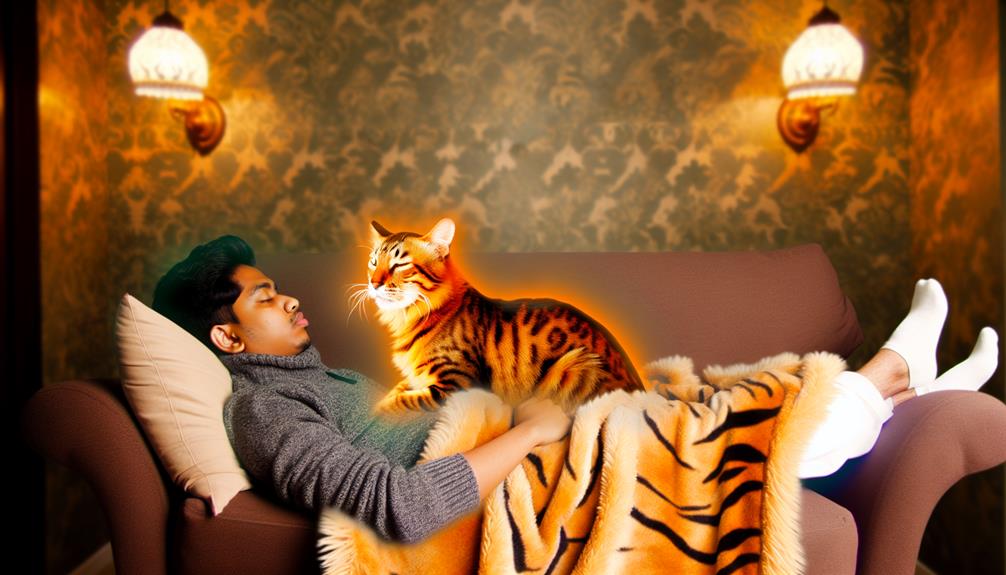Have you ever wondered why your cat insists on sleeping on you? There's more to it than just a cozy bed. From seeking warmth to showing affection, your feline friend's behavior is deeply rooted in instinctual needs and social bonds. Understanding these reasons can offer fascinating insights into your cat's world and enhance the connection you share. But what exactly motivates this endearing habit, and how does it impact both of you? Let's explore the intriguing dynamics behind your cat's preference for snuggling up on you.
Seeking Warmth
One of the primary reasons cats choose to sleep on you is their innate drive for warmth. Cats are naturally adept at seeking out ideal conditions for temperature regulation, and your body heat provides an ideal source. Feline behavior is heavily influenced by their need to maintain a stable internal temperature, known as thermoregulation. This need is especially pronounced because cats have a higher baseline body temperature compared to humans, typically around 101 to 102.5 degrees Fahrenheit.
In colder environments, a cat's body will expend more energy to maintain this higher temperature. By sleeping on you, they effectively reduce the energy required for thermogenesis, the process of heat production in organisms. Research indicates that warmth-seeking behaviors are deeply ingrained in felines, tracing back to their wild ancestors who would huddle together or find sunlit spots to conserve energy.
Furthermore, cats possess a keen sense of thermal perception, allowing them to detect warmer areas in their surroundings. This thermal acuity is part of why they often choose to curl up on your lap or chest, areas of your body that emit significant warmth. The behavior is not random but a calculated act to achieve thermal comfort.
It's also worth noting that your consistent body temperature provides a more reliable heat source compared to other potential resting spots within your home. While cats have various strategies for temperature regulation, including seeking sunny spots or cozy blankets, the direct warmth from your body remains one of the most efficient methods. Understanding this aspect of feline behavior can help you appreciate why your cat gravitates towards you for sleep, especially during colder months.
Bonding and Affection
In addition to seeking warmth, cats sleep on you as a means of bonding and expressing affection. This behavior is rooted in their early developmental stages, where kittens sleep in close proximity to their mother and littermates. This close contact fosters a sense of security and attachment, which translates into their adult behavior. When your cat chooses to sleep on you, it's engaging in cat communication that signifies trust and a strong emotional connection.
The act of a cat sleeping on you is a form of affiliative behavior, which is a type of social interaction that promotes bonding. Studies have shown that physical closeness between cats and their owners can lead to the release of oxytocin, often referred to as the "love hormone," which reinforces social bonds and emotional well-being. This hormone is not only beneficial for your cat but also for you, as it can create a mutual sense of calm and happiness.
Moreover, cats are known for their intricate social structures and communication methods. By choosing to sleep on you, your cat is utilizing its body language to communicate its attachment and reliance on you as a member of its social group. This form of cat communication is subtle yet highly significant, as it demonstrates your cat's perception of you as a safe and comforting presence.
Marking Territory

Beyond the domain of bonding and affection, cats often sleep on you as a method of marking their territory. This behavior is deeply rooted in their territorial instincts. When your cat chooses to sleep on you, it's engaging in scent marking, a process where it transfers its unique scent to you. This scent marking serves multiple purposes, primarily signaling to other animals that you are part of its territory.
Cats possess specialized scent glands located in various parts of their bodies, including their paws, cheeks, and flanks. When they sleep on you, these glands secrete pheromones that permeate your clothing and skin. This act of scent marking is a form of communication within the feline world, reinforcing their territorial behavior. Research indicates that these pheromones provide a sense of security for your cat, creating a familiar and comforting environment.
From a clinical perspective, territorial behavior is a fundamental aspect of a cat's psychological health. When a cat feels secure in its territory, it exhibits lower levels of stress and anxiety. Sleeping on you and marking you with its scent helps your cat establish a safe zone, reducing the likelihood of conflict with other animals. Studies have shown that a well-marked territory can decrease aggressive behaviors and promote a more relaxed demeanor in cats.
Instinctual Behavior
Cats' instinctual behavior drives many of their actions, including their choice to sleep on you. This behavior is deeply rooted in their evolutionary adaptations and survival mechanisms. For instance, a cat's hunting instincts influence its preference for specific resting spots. In the wild, felines need to be vigilant and find secure locations to sleep that are free from potential threats. Your body provides a warm, elevated, and presumably safe surface, mimicking the secure environment they seek in nature.
Moreover, the concept of social hierarchy plays a significant role. Cats are territorial animals and often establish a social order within their living environment. By choosing to sleep on you, your cat might be asserting its position within this hierarchy. In multi-cat households, the dominant cat is more likely to claim the prime resting spots, including you, as a way of reinforcing its status.
Research indicates that cats also use this behavior to strengthen their bond with you. In feral cat colonies, mutual grooming and close physical contact are common practices among bonded individuals. Sleeping on you can be seen as an extension of these behaviors, signifying trust and a strong social bond. This act is not merely a sign of affection but also an instinctual behavior designed to maintain social cohesion.
Additionally, the need to conserve energy is paramount for predators like cats. By sleeping on you, they are ensuring they remain close to a dependable source of warmth and security, thereby minimizing the energy expenditure required to regulate their body temperature. Understanding these instinctual behaviors provides greater insight into why your cat finds such comfort in sleeping on you.
Security and Comfort

When your cat curls up on you, it's not merely a sign of affection but a complex behavior driven by a need for security and comfort. Feline instincts are deeply rooted in their evolutionary history, and these behaviors are evident in their sleep patterns. By sleeping on you, your cat is seeking a safe, warm environment that mimics the protection they would have sought in the wild.
Cats are both predator and prey animals, which means their sleep patterns are adapted for vigilance and quick response to potential threats. When your cat chooses to sleep on you, it's leveraging your presence to feel secure. This behavior minimizes the risk of predation, allowing for a deeper, more restful sleep.
Why Your Cat Sleeps on You:
- Safety: Your cat perceives you as a protector, reducing their perceived threat level.
- Warmth: Cats have a higher body temperature than humans, and your body heat provides an ideal sleeping spot.
- Bonding: Close physical contact strengthens the human-animal bond, promoting a sense of belonging.
- Calmness: Your steady breathing and heartbeat can have a calming effect on your cat, enhancing their sleep quality.
- Territory: By sleeping on you, your cat may be marking you as part of their territory, reinforcing their sense of control and security.
Understanding these behaviors through the lens of feline instincts and sleep patterns provides insight into the complex motivations behind your cat's actions. This knowledge can help you foster a more comfortable and secure environment for your feline companion, ultimately enhancing their well-being and your relationship with them.
Conclusion
Essentially, your cat's behavior is a blend of seeking warmth, bonding, marking territory, and instinctual behavior. Much like Sherlock Holmes seeking clues, your cat finds solace and security in your presence. This behavior, deeply rooted in their evolutionary history, fosters mutual relaxation and reduces stress, reinforcing the bond you share. So, next time your feline friend curls up on you, remember they're not just seeking warmth; they're expressing a profound, evolutionary-driven trust and affection.
